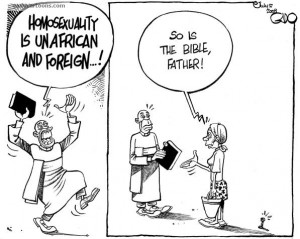As early as a couple of months ago in a heated debate with a friend and colleague while the Nigerian Gay Ban bill was still being debated in the National Assembly, I was confronted by what was supposed to be a winning argument against the “encouragement” or “tolerance” of homosexuality in the world: Imagine one Society A, he said to me, where all its citizens are gay. Now imagine another, Society B, where all its citizens are straight. Which one, over a hundred year period, will still have people living in it?
 It was a simplistic argument, one I’d heard a number of times before, and in different forms. It was also easily parried, but that never ended the conversation which went on and on until we were both tired. In the end, out of respect for the years of friendship, we agreed to disagree with our egos and friendships intact. Having spent a whole day on Facebook today since the draconian law was finally assented to by the president, I have witness a recreation of more intense versions of that same argument between friends, colleagues and acquaintances. Like what I had with my friend, the arguments have centered on biology, morality, religion, culture, and politics.
It was a simplistic argument, one I’d heard a number of times before, and in different forms. It was also easily parried, but that never ended the conversation which went on and on until we were both tired. In the end, out of respect for the years of friendship, we agreed to disagree with our egos and friendships intact. Having spent a whole day on Facebook today since the draconian law was finally assented to by the president, I have witness a recreation of more intense versions of that same argument between friends, colleagues and acquaintances. Like what I had with my friend, the arguments have centered on biology, morality, religion, culture, and politics.
It has been noted, for instance, that (unlike what is obtainable in other advanced democracies), major opposition leaders, and prominent politicians in the country, haven’t been pursued by hard-hitting journalists in order to get them on record about the new law that not only criminalizes sexual orientation and public displays of affection, but effectively bans the freedom of association already guaranteed under the constitution. Those committed to the easier (but empty) debate about “Adam and Steve” have done so as well, along with those who curiously believe that their cultures were as intolerant to people of different orientations as this new law is. A friend was asked to provide evidence that Yoruba people ever criminalized orientation before colonialism. He had no evidence. He however insisted that the absence of gay people in popular Yoruba literature is a sign that gay people NEVER existed in Yorubaland. His words. Those who hid behind religion were either shocked, disbelieving, or indifferent that the Pontiff recently exhibited an attitude of inclusion to those of different orientation than us.
It’s easy to wonder, in the safety of one’s heterosexual privilege whether the law does nothing more than scare people: a toothless bulldog. Then one reads a news story where barely hours after the law was signed, dozens of people have already been arrested, and the mind is changed. I told a friend that I already belong to an association that supports the rights and aspirations of everyone, including gay people, everywhere. That association is called: writers. (It should have been called “Christians”, I know). But then one looks twitter and just a handful of Nigerian writers have said anything of note against the law. Like Christians, it has become easy to keep quiet since, on the surface, it doesn’t seem as if one is personally affected. When the freedom of association is criminalized, then the floodgates for tyranny is already open. It’s a terrible setback, in any case.
As for the answer I gave my friend with whom I had the earlier debate, in a hundred years, both societies will still have people living in them. Society A will still be filled with gay people, many new ones joining them from Society B from where they continue to be banished, while Society B will still continue to be filled with its new generation of intolerant straight people. If straight people don’t want anymore gay people in the world, they should probably stop giving birth to them.
Otherwise, we’re all in this world together, and should find a way to live together with equal rights and opportunities for all. I, for one, could do with stable and regular electricity.
No Comments to Nigeria’s Culture War so far. (RSS Feeds for comments in this post)
No one has commented so far, be the first one to comment!